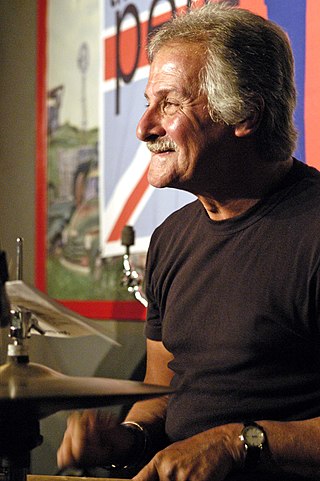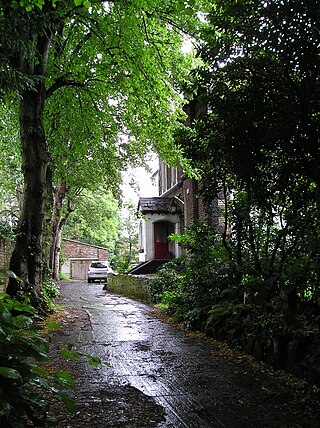Related Research Articles

Randolph Peter Best is an English musician who was the drummer for the Beatles from 1960 to 1962. He was dismissed shortly before the band achieved worldwide fame and is one of several people referred to as a fifth Beatle.

The washtub bass, or gutbucket, is a stringed instrument used in American folk music that uses a metal washtub as a resonator. Although it is possible for a washtub bass to have four or more strings and tuning pegs, traditional washtub basses have a single string whose pitch is adjusted by pushing or pulling on a staff or stick to change the tension.

The Quarrymen are a British skiffle and rock and roll group, formed by John Lennon in Liverpool in 1956, which evolved into the Beatles in 1960. Originally consisting of Lennon and several school friends, the Quarrymen took their name from a line in the school song of their school, the Quarry Bank High School. Lennon's mother, Julia, taught her son to play the banjo, showed Lennon and Eric Griffiths how to tune their guitars in a similar way to the banjo, and taught them simple chords and songs.

Brian Samuel Epstein was an English music entrepreneur who managed the Beatles from 1961 until his death in 1967.

Alice Mona Best was a British music club proprietor, best known as the owner of The Casbah Coffee Club, a club in Liverpool which served as a venue for rock and roll music during the late 1950s and 1960s. Among the bands to play at The Casbah was the Beatles, for whom her son Pete Best was a drummer at the time. Mona Best also had two other sons, John Rory, and Vincent "Roag" Best. It was later confirmed that Roag's father was Beatles' associate, music executive Neil Aspinall, although he was not registered as the father on Roag's birth certificate.

Leonard Charles 'Len' Garry is an English musician, best known for being a member of The Quarrymen, a band who would later evolve into The Beatles.

Rory Storm was an English musician and vocalist. Born in Liverpool, Storm was the singer and leader of Rory Storm and the Hurricanes, a Liverpudlian band who were contemporaries of The Beatles in the late 1950s and early 1960s. Ringo Starr was the drummer for the Hurricanes before joining the Beatles in August 1962.

Eric Ronald Griffiths was a British musician and dry cleaner, he was best known as the guitarist in the original lineup of the Quarrymen until he left the group in the summer of 1958.
William Harry is the creator of Mersey Beat, a newspaper of the early 1960s which focused on the Liverpool music scene. Harry had previously started various magazines and newspapers, such as Biped and Premier, while at Liverpool's Junior School of Art. He later attended the Liverpool College of Art, where his fellow students included John Lennon and Stuart Sutcliffe, who both later performed with the Beatles. He published a magazine, Jazz, in 1958, and worked as an assistant editor on the University of Liverpool's charity magazine, Pantosphinx.

Mary Elizabeth "Mimi" Smith was a maternal aunt and the parental guardian of the English musician John Lennon. Mimi Stanley was born in Toxteth, Liverpool, England, the oldest of five daughters. She became a resident trainee nurse at the Woolton Convalescent Hospital and later worked as a private secretary. On 15 September 1939 she married George Toogood Smith who ran his family's dairy farm and a shop in Woolton, a suburb of Liverpool.

Julia Lennon was the mother of English musician John Lennon, who was born during her marriage to Alfred Lennon. After complaints to Liverpool's Social Services by her eldest sister Mimi Smith, she surrendered the care of her son to Mimi. She later had one daughter after an affair with a Welsh soldier, but pressure from her family made her place the baby for adoption. Later she had two daughters, Julia and Jackie, with John "Bobby" Dykins. She never divorced her husband, preferring to live as Dykins' common-law wife for the rest of her life.

Alfred Lennon, also known as Freddie Lennon, was an English seaman and singer who was best known as the father of musician John Lennon. Alfred spent many years in an orphanage with his sister, Edith, after his father died.

The Casbah Coffee Club, officially Casbah Club, was a rock and roll music venue in the West Derby area of Liverpool, England, that operated from 1959 to 1962. Started by Mona Best, mother of early Beatles drummer Pete Best, in the cellar of the family home, the Casbah was planned as a members-only club for her sons Pete and Rory and their friends, to meet and listen to the popular music of the day. Mona came up with the idea of the club after watching a TV report about the 2i's Coffee Bar in London's Soho where several singers had been discovered.

Julia Baird is a British retired teacher and author. She is the younger half-sister of English musician John Lennon, and is the eldest daughter of his mother Julia Lennon and John 'Bobby' Albert Dykins. She also has an older maternal half-sister, Ingrid Pedersen. Her younger sister is Jacqueline 'Jackie' Dykins.

Phillips' Sound Recording Services was a studio in the house of Percy Francis Phillips (1896–1984) and his family at 38 Kensington, Kensington, Liverpool, England. Between 1955 and 1969, Phillips recorded numerous tapes and acetate discs for Liverpool acts, people and businesses in a small room behind the shop his family owned.
The Cavern Club at 10 Mathew Street, in Liverpool was the venue where the Beatles' UK popularity started. John Lennon, Paul McCartney, George Harrison and Pete Best were first seen by Brian Epstein at the club. Epstein eventually became their manager, going on to secure them a record contract. Best was replaced by Ringo Starr on 16 August 1962, which upset many Beatles fans. After taunts of, "Pete forever, Ringo never!", one agitated fan headbutted Harrison in the club.

The Cavern Club is a music venue on Mathew Street, Liverpool, England.

In His Life: The John Lennon Story is a 2000 American made-for-television biographical film about John Lennon's teenage years, written by the film's executive producer, Michael O'Hara, and directed by David Carson.

Rodney Verso Davis is an English musician, best known for being a member of The Quarrymen, a band who would later evolve into The Beatles.
William Frederick Smith is an English former musician, who was a founding member of The Quarrymen. His tenure with the group was short, only performing with them for one month.
References
- Cross, Craig (2004). Beatles-discography.Com: Day-by-Day Song-by-Song Record-by-Record. iUniverse. ISBN 978-0-595-31487-4.
- Miles, Barry (1997). Many Years From Now . Vintage-Random House. ISBN 978-0-7493-8658-0.
- Miles, Barry (2002). The Beatles Diary: The Beatles Years v. 1 (eBook). Music Sales Ltd. ISBN 978-0-85712-000-7.
- Ryan, David Stuart (1982). John Lennon's Secret: A Biography. Kozmik Press. ISBN 978-0-905116-08-2.
- Spitz, Bob (2005). The Beatles: The Biography . Little, Brown and Company. ISBN 978-0-316-80352-6.